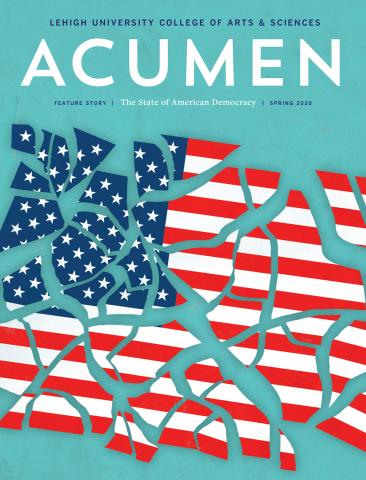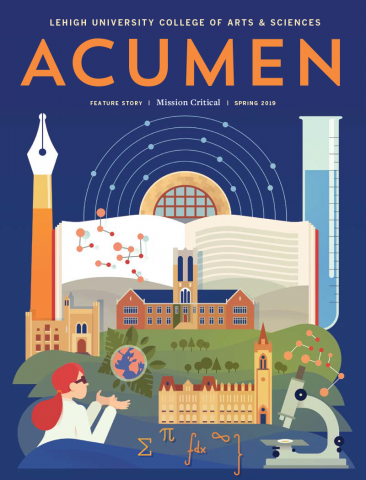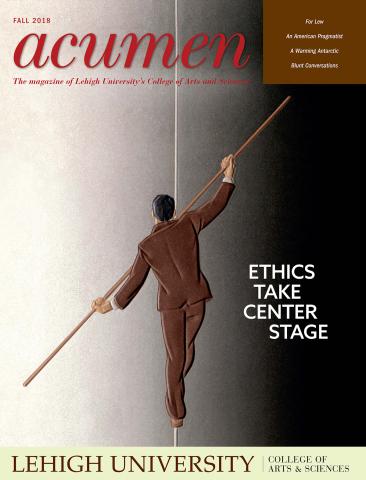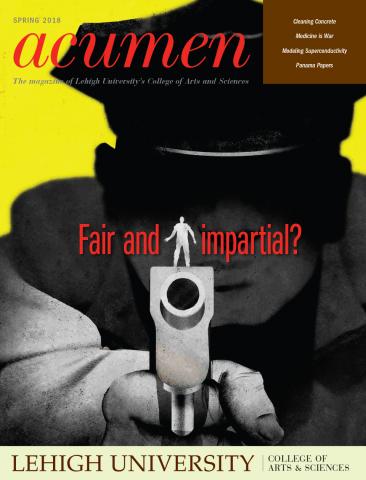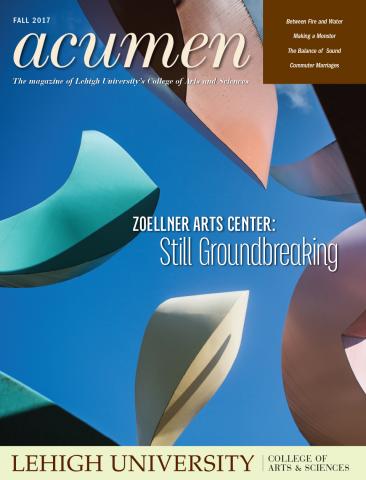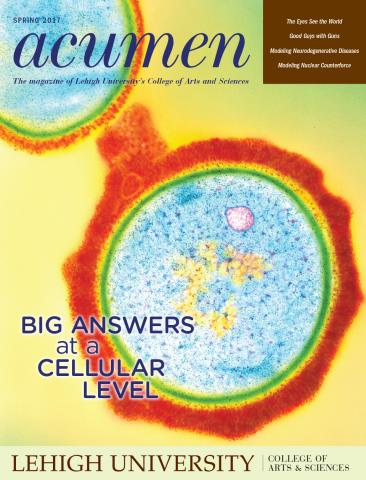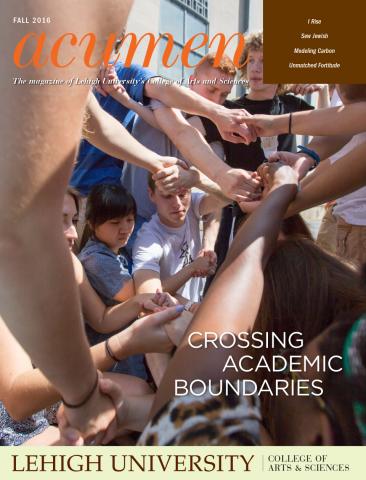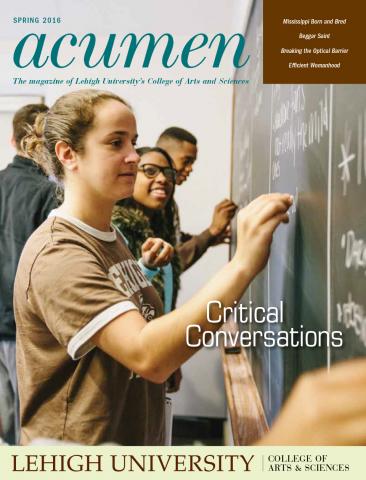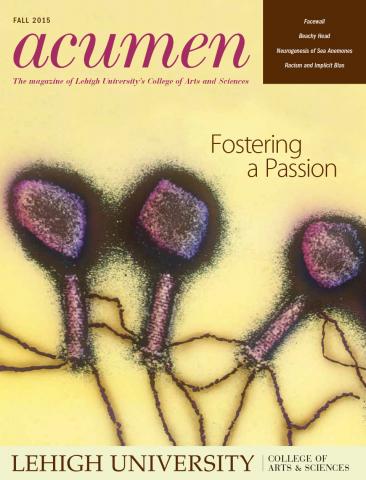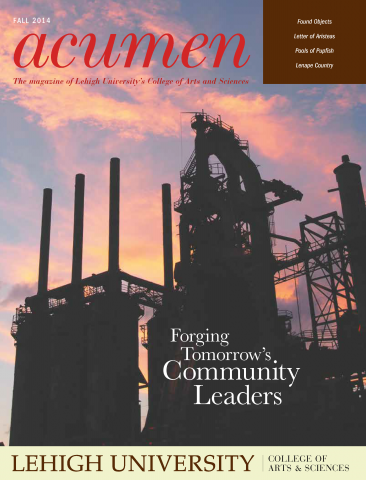
Liz Duffy Adams, Lehigh University’s Theodore U. Horger ’61 Endowed Artist-in-Residence for the Performing and Visual Arts, wrote the play The Broken Machine partly inspired by the devastating 2018 California wildfires. Since then, new wildfires have raged not only in California but also throughout much of Australia, with dozens of human lives, and millions of animal lives, lost just as the world welcomed the new decade on January 1.
Adams’s play, which premiered in the Diamond Theater at Zoellner Arts Center in November of last year, follows the titular character, a computer programmer, as she escapes to the woods after the World Wide Web crashes. There, she befriends a gray fox before a large fire breaks out, moving at 25 miles per hour. As they flee through the wilderness, they’re pursued by would-be rescuers and threatened by a non-binary, mythic-punk psychopomp — a creature who guides deceased souls to the afterlife.
The Broken Machine, commissioned specially for Lehigh University, also happens to be theatre professor Pam Pepper’s last production, as she is retiring in August after 33 years in the theatre department.
Pepper, who teaches acting and directing, has worked in professional theatre as a director, literary manager, and administrator, and came to the Lehigh Valley as the associate director of the Pennsylvania Stage Company. She is a former College of Arts and Sciences associate dean and holds an MFA in directing from Ohio University.
“When you commission a piece,” says Pepper, “you commission it from a writer the theater knows or the producing group likes. [Liz] was an obvious choice because we all had these connections to her work.”
Pepper discovered Adams’s play Dog Act — which was performed at Lehigh University in October of 2018 — when she was involved in a script-sharing program with the New Dramatists in New York. Assistant Professor and scenographer Will Lowry had assisted with the set painting for the New York premiere of Dog Act through Flux Theatre Ensemble, where he is a creative partner. Scenic designer Melpomene Katakalos has known Adams for nearly 18 years, ever since her former theatre company, San Francisco-based Crowded Fire, decided to produce one of her plays.
Katakalos and Lowry were also part of the design team for The Broken Machine, along with costume designer Pam Richey, sound designer Phil Ingle, and composer Eugene Albulescu.
Pepper collaborated with Adams during Lehigh’s 2018 staging of Dog Act, communicating with her during the production, so she was familiar with her personality and temperament.
“She knows what she wants,” says Pepper, “but she's very open to other ideas. What's great about commissioning a play is trying things out and seeing if they work.”
And for Pepper and her design team, commissioning a play by a living playwright was both a rare opportunity and a challenge, albeit a welcome one.
“When you have the playwright there, it complicates artistic decisions because there's another cook in the kitchen,” says Katakalos. “But you can ask what the head cook’s intention is. Sometimes they don't know — sometimes they're just like, ‘Oh, I don't want to answer that, that's for you to answer in the production.’”
Katakalos also had the benefit of comparing her design on a previous Adams play to her design for The Broken Machine.
“When Liz saw Dog Act,” says Katakalos, “I asked her what she thought of the design. She said she liked it, but wouldn't have designed as much stuff.”
“So I had that in my head when I designed [The Broken Machine]. I didn't have to define every corner of the stage. I just decided less is more, and she loved that.”
Will Lowry also had the challenge of illuminating, rather than illustrating the whole story of the play moment by moment, when it came to the lighting for the play.
“We needed to tell the story of the world burning,” says Lowry, “and Liz, in writing it, has probably not tracked the advancement of the fire or what it will look like.”
For Lowry, that meant that there couldn’t be an orange sky for the full length of the play, for example, because the audience’s eyes would just habituate to it, lessening its dramatic impact.
“So having to track an oncoming threat that's not on the doorway just yet, while also being true to like the specifics of the script of a living playwright, was something I was very concerned about,” says Lowry.
Fortunately, Adams was completely on board with Lowry’s interpretation.
Phil Ingle, who hasn’t worked with a living playwright or on a brand new work before, considers the act of interpretation as a refining or maturing of Adams’s original vision for the play.
“One of the interesting things about working with a living playwright, especially on a new work, is that Liz sees and hears one thing, Pam sees and hears another, Mellie sees and hears another thing, and I see something else,” says Phil Ingle.
“If I looked at the very first draft of the script versus what we ended up with at the end, they're very different plays — but we all were a part of that the whole time, and it was really a lot of fun.
Due to Pam Pepper’s retirement, this is the last time all six team members will be working together; but they will carry the memories and experiences of working with her into their future productions.
“The first show I designed at Lehigh was a Pam Pepper show,” says Pam Richey, “and what I've learned from her during my time here is all about production values. She’s the strongest proponent of theatre being organic, looking for the performers to find those moments, really looking for a quality production.”
Eugene Albulescu, who has known Pepper the longest of the team, admires how she juggles all the production elements that go into a play — but says he’s most impressed by her directing of the acting itself.
“It's knowing when to place boundaries for actors,” he says, “like, ‘This is too much,’ or ‘This is too little.’ I found it fascinating to be at rehearsals and to see the whole process.”
“I've done three productions with Pam,” says Lowry. “I think what really drew me and made me excited about working with her is the collaborative flexibility that Eugene was talking about. She has an eye towards the full synthesis of everything and an understanding of the give-and-take that requires.”
For Pepper, she couldn’t imagine a better way to end a career at Lehigh.
“This was a really wonderful group effort on so many levels,” she says. “It was a perfect way for me to collaborate with people that I've worked with for a really long time and have enjoyed working with beyond measure.”




















